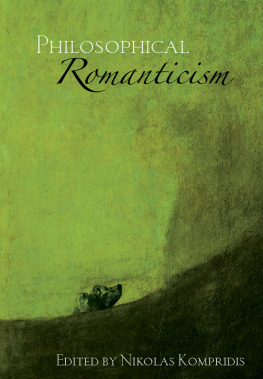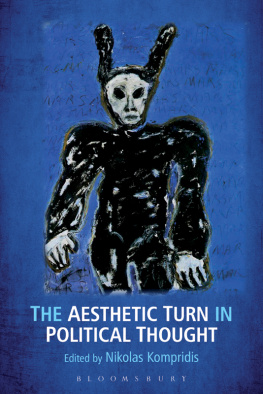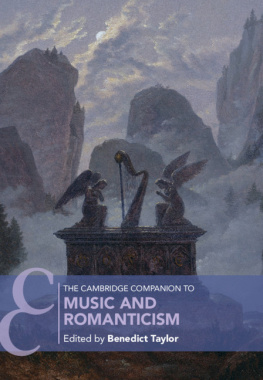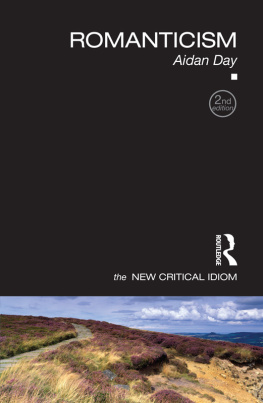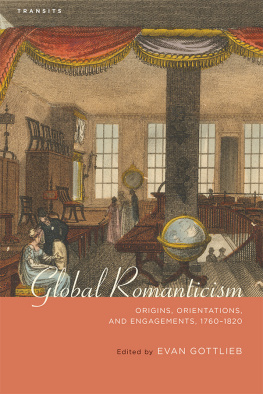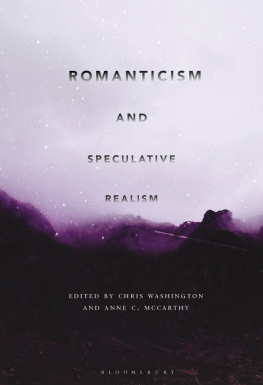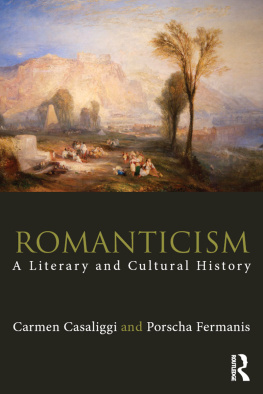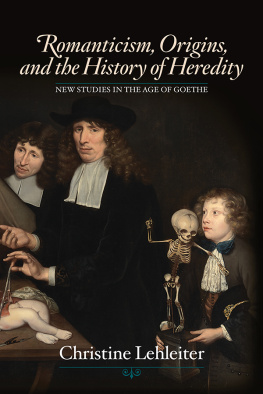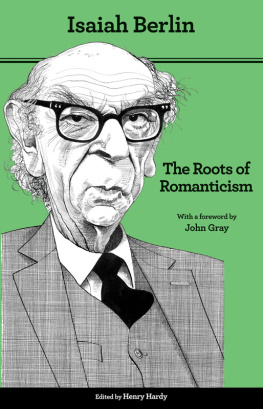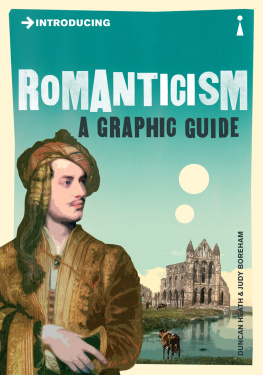Kompridis - Philosophical Romanticism
Here you can read online Kompridis - Philosophical Romanticism full text of the book (entire story) in english for free. Download pdf and epub, get meaning, cover and reviews about this ebook. City: London, year: 2006, publisher: Routledge, genre: Romance novel. Description of the work, (preface) as well as reviews are available. Best literature library LitArk.com created for fans of good reading and offers a wide selection of genres:
Romance novel
Science fiction
Adventure
Detective
Science
History
Home and family
Prose
Art
Politics
Computer
Non-fiction
Religion
Business
Children
Humor
Choose a favorite category and find really read worthwhile books. Enjoy immersion in the world of imagination, feel the emotions of the characters or learn something new for yourself, make an fascinating discovery.
- Book:Philosophical Romanticism
- Author:
- Publisher:Routledge
- Genre:
- Year:2006
- City:London
- Rating:4 / 5
- Favourites:Add to favourites
- Your mark:
- 80
- 1
- 2
- 3
- 4
- 5
Philosophical Romanticism: summary, description and annotation
We offer to read an annotation, description, summary or preface (depends on what the author of the book "Philosophical Romanticism" wrote himself). If you haven't found the necessary information about the book — write in the comments, we will try to find it.
Philosophical Romanticism — read online for free the complete book (whole text) full work
Below is the text of the book, divided by pages. System saving the place of the last page read, allows you to conveniently read the book "Philosophical Romanticism" online for free, without having to search again every time where you left off. Put a bookmark, and you can go to the page where you finished reading at any time.
Font size:
Interval:
Bookmark:
PHILOSOPHICAL ROMANTICISM
Philosophical Romanticism is one of the first books to address the relationship between philosophy and romanticism, an area which is currently undergoing a major revival. This collection of specially written articles by world-class philosophers renews the tradition of philosophical romanticism by exploring and enlarging its contribution to topics such as freedom, autonomy and subjectivity; the normativity of the new; philosophy's relation to its own time; memory and imagination; art and ethics; skepticism and irony; and cosmology and technology.
While the roots of romanticism are to be found in Kant, German romanticism and German idealism, Philosophical Romanticism shows that it is not a purely European phenomenon: the development of romanticism can be traced through to North American philosophy in the era of Thoreau, Emerson and Dewey, and up to the current work of Stanley Cavell, Charles Taylor and Richard Rorty. The articles in this collection suggest that philosophical romanticism offers a compelling alternative to both the reductionist tendencies of naturalism dominating current analytic philosophy, and the skeptical tendencies dominating current continental philosophy.
This outstanding collection will be of interest to those studying philosophy, literature and nineteenth- and twentieth-century thought.
Contributors: Frederick Beiser, J. M. Bernstein, Albert Borgmann, Stanley Cavell, Hubert Dreyfus, Richard Eldridge, Jane Kneller, David Kolb, Nikolas Kompridis, Jeff Malpas, Robert Pippin, Fred Rush, Martin Seel, Charles Spinosa.
Nikolas Kompridis is currently Assistant Professor of Philosophy at York University, and author of Critique and Disclosure: Critical Theory Between Past and Future.
PHILOSOPHICAL
ROMANTICISM
Edited by Nikolas Kompridis

First published 2006
by Routledge
2 Park Square, Milton Park, Abingdon, Oxon OX14 4RN
Simultaneously published in the USA and Canada
by Routledge
270 Madison Ave, New York, NY, 10016
Routledge is an imprint of the Taylor & Francis Group, an informa business
2006 Nikolas Kompridis for selection and editorial matter; individual contributors for their contributions
Typeset in Goudy by
Taylor & Francis Books
Printed and bound in Great Britain by
TJ International Ltd, Padstow, Cornwall
All rights reserved. No part of this book may be reprinted or reproduced or utilized in any form or by any electronic, mechanical, or other means, now known or hereafter invented, including photocopying and recording, or in any information storage or retrieval system, without permission in writing from the publishers.
British Library Cataloguing in Publication Data
A catalogue record for this book is available from the British Library
Library of Congress Cataloging in Publication Data
A catalog record for this book has been requested
ISBN10 0-415-25643-7 ISBN13 978-0-415-25643-8 (hbk)
ISBN10 0-415-25644-5 ISBN13 978-0-415-25644-5 (pbk)
ISBN10 0-203-50737-1 ISBN13 978-0-203-50737-7 (ebk)
FOR KAELEN
Each individual that comes into the world is a new beginning; the universe itself is, as it were, taking a fresh start in him and trying to do something, even if on a small scale, that it has never done before.
(John Dewey, Construction and Criticism, Later Works, Volume 5)
CONTENTS
NIKOLAS KOMPRIDIS
PART I
Beginning anew
STANLEY CAVELL
NIKOLAS KOMPRIDIS
DAVID KOLB
PART II
Self-determination and self-expression
MARTIN SEEL
RICHARD ELDRIDGE
ROBERT PIPPIN
PART III
Art and irony
J. M. BERNSTEIN
FRED RUSH
JANE KNELLER
PART IV
The living force of things
FREDERICK BEISER
ALBERT BORGMANN
PART V
Returning the everyday
HUBERT L. DREYFUS AND CHARLES SPINOSA
JEFF MALPAS
ACKNOWLEDGEMENTS
Before all, I would like to express my thanks and gratitude to all the contributors to this volume, first, for their splendid contributions, and second, for their enthusiastic support and cooperation.
The volume possesses an uncanny unity that is owed entirely to their contributions and the deep attunement to the volume's overall goals with which they were written. Perhaps, this uncanny unity across differences in approach and in topics is itself a persuasive indication of the contemporary actuality of philosophical romanticism.
I want also to thank Tony Bruce at Routledge for taking a keen interest in this project from the very beginning, and for his support and patience throughout.
The volume is dedicated to my son Kaelen, from whom I have learned that the success of any new beginning, no matter how well begun, rests on a generous act of self-transformation. His new beginning was mine as well. For that, and so much more, I am deeply thankful.
Finally, I should say a word or two about my choice of cover image for the volume, Francisco Goya's The Dog, one of his very last paintings. Why this image, one might ask? It is surely very poignant, and just as surely very ambiguous. Is the dog in a state of wonder or displacement? Is it meant to suggest hope or despair? Is that sun rising or setting (for him, for us)? Is it mourning an irrecoverable loss, perhaps, the loss of its voice, or awaiting some new possibility, a second chance, a new beginning? What of the future that lies ahead (or hovers above) is it welcoming or indifferent? What blocks our view? What must we overcome to open our view of things, to open the horizon again? Since these are some of the central questions of romanticism, questions that we cannot and should not evade even if we can't come up with definitive answers, I cannot think of a better cover image to represent this volume than this ordinary-looking dog set in what looks like an extraordinary situation.
CONTRIBUTORS
Frederick Beiser is Professor of Philosophy at Syracuse University. He is the author of The Fate of Reason (1987); Enlightenment, Revolution and Romanticism (1992); German Idealism (2002); and The Romantic Imperative (2003).
J. M. Bernstein is University Distinguished Professor of Philosophy at the New School for Social Research, New York. Among his works are: Against Voluptuous Bodies: Late Modernism and the Idea of Painting (2005); Adorno: Disenchantment and Ethics (2001); and The Fate of Art (1992). He edited and introduced the volume on Classical and Romantic German Aesthetics (2002) in the Cambridge History of Philosophy series.
Albert Borgmann is Regents Professor of Philosophy at the University of Montana, Missoula, where he has taught since 1970. His special area is the philosophy of society and culture. Among his publications are Technology and the Character of Contemporary Life (1987); Crossing the Postmodern Divide (1992); Holding On to Reality: The Nature of Information at the Turn of the Millennium (1999); and Power Failure: Christianity in the Culture of Technology (2003).
Stanley Cavell is Walter M. Cabot Professor Emeritus of Aesthetics and the General Theory of Value, at Harvard University. He is the author of Must We Mean What We Say? A Book of Essays (1969, reprinted 1976); The Claim of Reason: Wittgenstein, Skepticism, Morality and Tragedy (1979); In Quest of the Ordinary: Lines of Skepticism and Romanticism (1988); This New yet Unapproachable America: Lectures after Emerson after Wittgenstein
Next pageFont size:
Interval:
Bookmark:
Similar books «Philosophical Romanticism»
Look at similar books to Philosophical Romanticism. We have selected literature similar in name and meaning in the hope of providing readers with more options to find new, interesting, not yet read works.
Discussion, reviews of the book Philosophical Romanticism and just readers' own opinions. Leave your comments, write what you think about the work, its meaning or the main characters. Specify what exactly you liked and what you didn't like, and why you think so.

